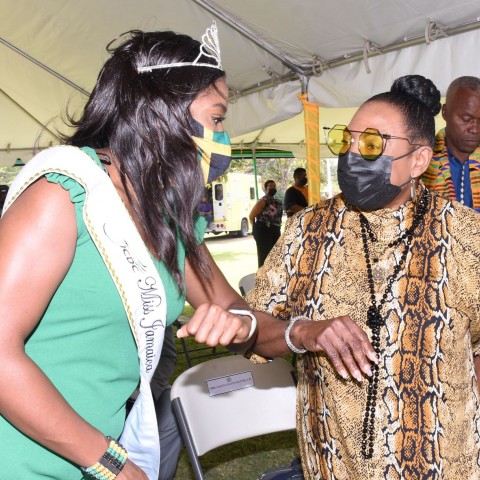
The Jamaica Cultural Development Commission (JCDC), an agency of the Ministry of Culture, Gender, Entertainment and Sport hosted a Wreath Laying Tribute to pay homage to The Right Excellent Samuel Sharpe, National Hero, at the National Heroes Park in Kingston, on Monday, May 23.
A number of national leaders were invited to lay wreaths, including: The Honourable Olivia Grange, CD, MP, and Minister of Culture, Gender, Entertainment and Sport; Andrew Harris, Councillor of the Hughenden Division representing His Worship the Mayor, Senator Councillor Delroy Williams, Mayor of Kingston and St. Andrew; Rev. Dr. Glenroy Lalor, President of the Jamaica Baptist Union; Mrs. Laleta Davis-Mattis, CD and Mr. Bert Samuels, Chair and Deputy Chairmen of the National Council on Reparations respectively.
The commemorative event was held in remembrance of the Right Excellent Samuel Sharpe, National Hero and also saw a musical tribute being made by Jamique Ensemble. Also, the Last Post and Reveille played by the Jamaica Regiment- Corps of Drum Buglers.
“As we start our regular Labour Day activities, it is true and fitting that we should pause to honour an iconic figure in the history of resistance to slavery and its final abolition in Jamaica – Right Excellent Samuel Sharpe. The National Hero stands tall among our Jamaican historic figures. Not only for the role he played, in negotiating better working conditions for the Jamaican enslaved population but also for his leadership in slavery which led to slavery’s end by the Act to abolish slavery passed in the British Parliament in 1833. Supported by random avid supporters such as Dub and Gardener, Sam Sharpe staged the first-ever recorded industrial action by a mass of persons when he organized a strike on December 27, 1831, the day after Boxing Day,” Minister Grange said.
Minister Grange further noted that the enslaved population were expected to return to the plantation after the Christmas break. Of significance too, was that Sam Sharpe was not a field slave. In fact, by all narratives, Sam Sharpe experienced some amount of special treatment which was a far cry from the horrific brutal experience under the regime of slavery.
“Sam Sharpe and mass, spent many hours, particularly at night meeting and planning for the proposed December 27 action. Our ancestors understood that none could be free until all were free. It is significant because it was the platform on which all campaigns against slavery and oppression were staged. The rebellion laid the foundation for the wider liberation movements as the promotion of Pan-Africanism by Marcus Mosiah Garvey who took it to another level to include African people,” Grange said.
Samuel Sharpe was the main instigator of the 1831 Slave Rebellion, which began on the Kensington Estate in St. James and which was largely instrumental in bringing about the abolition of slavery. Because of his intelligence and leadership qualities, Sam Sharpe became a “daddy”, or leader of the native Baptists in Montego Bay. Religious meetings were the only permissible forms of organised activities for the slaves.
Sam Sharpe was able to communicate his concern and encourage political thought, concerning events in England which affected the slaves and Jamaica. Sam Sharpe evolved a plan of passive resistance, by which the slaves would refuse to work on Christmas Day of 1831 and afterwards, unless their grievances concerning the better treatment and the consideration of freedom, were accepted by the state owners and managers.
Samuel Sharpe was hanged on May 23, 1832. In 1834 the Abolition Bill was passed by the British Parliament and in 1838, slavery was abolished. Sharpe had said: “I would rather die upon yonder gallows than live in slavery”. On March 31, 1982, the Right Excellent Sam Sharpe was conferred with the Order of the National Hero as per Government Notice 23 Jamaica Gazette.


